初中英语——If引导的条件状语从句[1]
- 格式:doc
- 大小:26.50 KB
- 文档页数:3
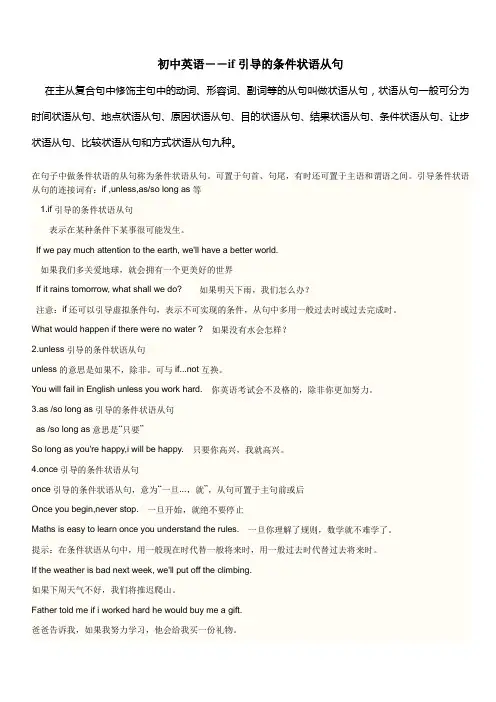
初中英语――if引导的条件状语从句在主从复合句中修饰主句中的动词、形容词、副词等的从句叫做状语从句,状语从句一般可分为时间状语从句、地点状语从句、原因状语从句、目的状语从句、结果状语从句、条件状语从句、让步状语从句、比较状语从句和方式状语从句九种。
在句子中做条件状语的从句称为条件状语从句。
可置于句首、句尾,有时还可置于主语和谓语之间。
引导条件状语从句的连接词有:if ,unless,as/so long as等1.if引导的条件状语从句表示在某种条件下某事很可能发生。
If we pay much attention to the earth, we'll have a better world.如果我们多关爱地球,就会拥有一个更美好的世界If it rains tomorrow, what shall we do? 如果明天下雨,我们怎么办?注意:if还可以引导虚拟条件句,表示不可实现的条件,从句中多用一般过去时或过去完成时。
What would happen if there were no water ? 如果没有水会怎样?2.unless引导的条件状语从句unless的意思是如果不,除非。
可与if...not互换。
You will fail in English unless you work hard. 你英语考试会不及格的,除非你更加努力。
3.as /so long as引导的条件状语从句as /so long as意思是“只要”So long as you're happy,i will be happy. 只要你高兴,我就高兴。
4.once引导的条件状语从句once引导的条件状语从句,意为“一旦...,就”,从句可置于主句前或后Once you begin,never stop. 一旦开始,就绝不要停止Maths is easy to learn once you understand the rules. 一旦你理解了规则,数学就不难学了。
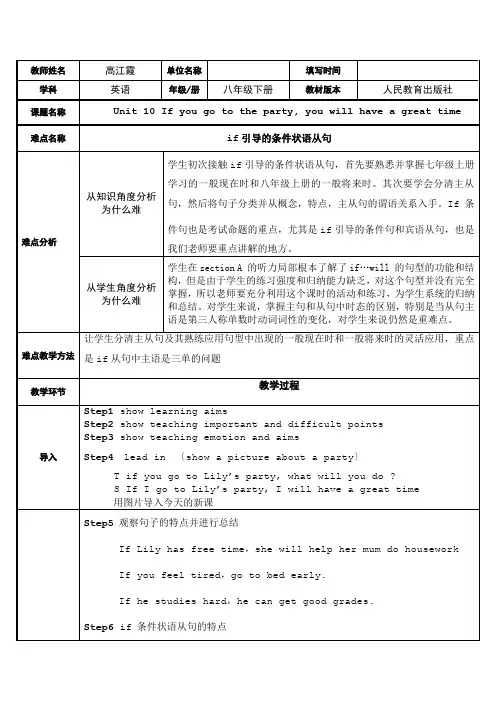
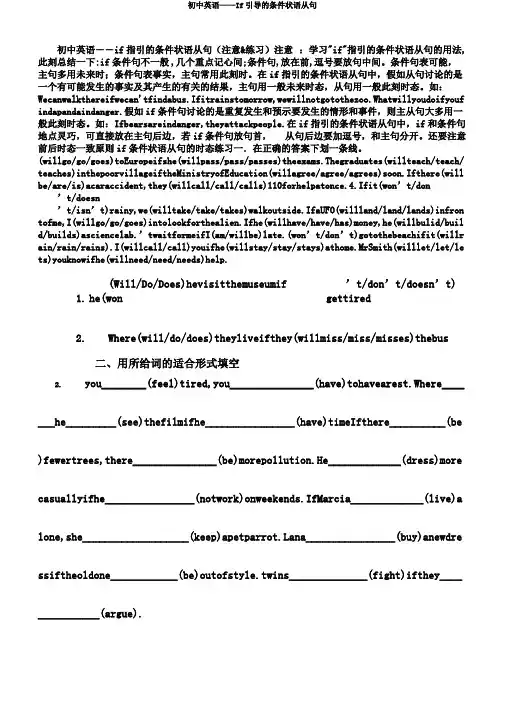
初中英语――if指引的条件状语从句(注意&练习)注意:学习"if"指引的条件状语从句的用法,此刻总结一下:if条件句不一般,几个重点记心间;条件句,放在前,逗号要放句中间。
条件句表可能,主句多用未来时;条件句表事实,主句常用此刻时。
在if指引的条件状语从句中,假如从句讨论的是一个有可能发生的事实及其产生的有关的结果,主句用一般未来时态,从句用一般此刻时态。
如:Wecanwalkthereifwecan'tfindabus.Ifitrainstomorrow,wewillnotgotothezoo.Whatwillyoudoifyouf indapandaindanger.假如if条件句讨论的是重复发生和预示要发生的情形和事件,则主从句大多用一般此刻时态。
如:Ifbearsareindanger,theyattackpeople.在if指引的条件状语从句中,if和条件句地点灵巧,可直接放在主句后边,若if条件句放句首,从句后边要加逗号,和主句分开。
还要注意前后时态一致原则if条件状语从句的时态练习一.在正确的答案下划一条线。
(willgo/go/goes)toEuropeifshe(willpass/pass/passes)theexams.Thegraduates(willteach/teach/ teaches)inthepoorvillageiftheMinistryofEducation(willagree/agree/agrees)soon.Ifthere(will be/are/is)acaraccident,they(willcall/call/calls)110forhelpatonce.4.Ifit(won’t/don ’t/doesn’t/isn’t)rainy,we(willtake/ta ke/takes)walkoutside.IfaUFO(willland/land/lands)infron tofme,I(willgo/go/goes)intolookforthealien.Ifhe(willhave/have/has)money,he(willbulid/buil d/builds)asciencelab.’twaitformeifI(am/willbe)late.(won’t/don’t)gotothebeachifit(willr ain/rain/rains).I(willcall/call)youifhe(willstay/stay/stays)athome.MrSmith(willlet/let/le ts)youknowifhe(willneed/need/needs)help.1 1.(Will/Do/Does)hevisitthemuseumifhe(won’t/don’t/doesn’t) gettired12.Where(will/do/does)theyliveifthey(willmiss/miss/misses)thebus二、用所给词的适合形式填空2.you________(feel)tired,you_______________(have)tohavearest.Where____ ___he_________(see)thefilmifhe________________(have)timeIfthere__________(be )fewertrees,there_______________(be)morepollution.He_____________(dress)more casuallyifhe________________(notwork)onweekends.IfMarcia_____________(live)a lone,she___________________(keep)na________________(buy)anewdre ssiftheoldone____________(be)outofstyle.twins______________(fight)ifthey____ ___________(argue).23.I____________(have)abakesaleifI_____________(need)moneyforeducation .Peter_____________(send)meabeautifulsouvenirifhe________________(tour)Spain .IfMrGreen___________(say)Iamhard-working,myparents_________(feel)glad.____________(go)tothebeachifit_________ _______(notrain)thisweek.__________they__________(have)amatchifthe.teacher__ ___________(be)busy____(write)alettertohisgrandparentsifhe____(get)hisreport cardthisweek.Ifshe____________(get)uplate,she_____________(notcatch)theearly bus.Peter________(major)inEnglishifhe____(pass)theexamsinPekingUniversity.假如他到的晚了会发生什么事情What_______________ifhe_____________late假如努力学习,你就会获得好成绩。
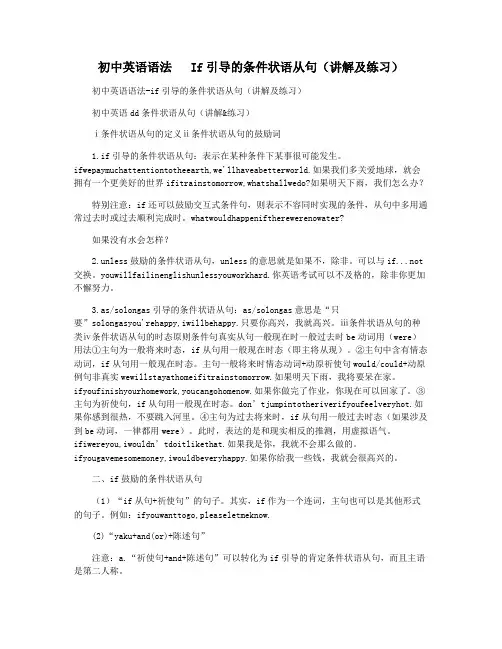
初中英语语法 If引导的条件状语从句(讲解及练习)初中英语语法-if引导的条件状语从句(讲解及练习)初中英语dd条件状语从句(讲解&练习)ⅰ条件状语从句的定义ⅱ条件状语从句的鼓励词1.if引导的条件状语从句:表示在某种条件下某事很可能发生。
ifwepaymuchattentiontotheearth,we'llhaveabetterworld.如果我们多关爱地球,就会拥有一个更美好的世界ifitrainstomorrow,whatshallwedo?如果明天下雨,我们怎么办?特别注意:if还可以鼓励交互式条件句,则表示不容同时实现的条件,从句中多用通常过去时或过去顺利完成时。
whatwouldhappeniftherewerenowater?如果没有水会怎样?2.unless鼓励的条件状语从句,unless的意思就是如果不,除非。
可以与if...not 交换。
youwillfailinenglishunlessyouworkhard.你英语考试可以不及格的,除非你更加不懈努力。
3.as/solongas引导的条件状语从句:as/solongas意思是“只要”solongasyou'rehappy,iwillbehappy.只要你高兴,我就高兴。
ⅲ条件状语从句的种类ⅳ条件状语从句的时态原则条件句真实从句一般现在时一般过去时be动词用(were)用法①主句为一般将来时态,if从句用一般现在时态(即主将从现)。
②主句中含有情态动词,if从句用一般现在时态。
主句一般将来时情态动词+动原祈使句would/could+动原例句非真实wewillstayathomeifitrainstomorrow.如果明天下雨,我将要呆在家。
ifyoufinishyourhomework,youcangohomenow.如果你做完了作业,你现在可以回家了。
③主句为祈使句,if从句用一般现在时态。
don’tjumpintotheriverifyoufeelveryhot.如果你感到很热,不要跳入河里。
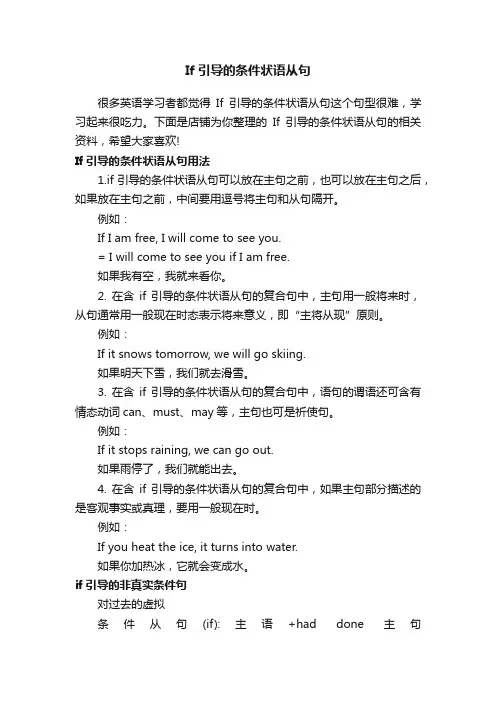
If引导的条件状语从句很多英语学习者都觉得If引导的条件状语从句这个句型很难,学习起来很吃力。
下面是店铺为你整理的If引导的条件状语从句的相关资料,希望大家喜欢!If引导的条件状语从句用法1.if引导的条件状语从句可以放在主句之前,也可以放在主句之后,如果放在主句之前,中间要用逗号将主句和从句隔开。
例如:If I am free, I will come to see you.= I will come to see you if I am free.如果我有空,我就来看你。
2. 在含if引导的条件状语从句的复合句中,主句用一般将来时,从句通常用一般现在时态表示将来意义,即“主将从现”原则。
例如:If it snows tomorrow, we will go skiing.如果明天下雪,我们就去滑雪。
3. 在含if引导的条件状语从句的复合句中,语句的谓语还可含有情态动词can、must、may等,主句也可是祈使句。
例如:If it stops raining, we can go out.如果雨停了,我们就能出去。
4. 在含if引导的条件状语从句的复合句中,如果主句部分描述的是客观事实或真理,要用一般现在时。
例如:If you heat the ice, it turns into water.如果你加热冰,它就会变成水。
if引导的非真实条件句对过去的虚拟条件从句(if):主语+had done 主句might/would/should/could+have done对现在的虚拟if+ 主语+动词过去式(be用were)主句might/would/should/could+do对将来的虚拟if+主语+动词过去式(be用were)或主语+should do或主语+were to do主句 might/would/should/could+doe.g.Tom got to the station in time because he started earlier.If Tom had started late, he would have missed the train.Do you think the thief entered through the door?No, if he had, I don't believe, he would have broken the living room window.If the book weren't so expensive, I would buy it.If you didn't live so far away, we would be able to visit you more.What would you do if you lost your passport in a foreign country?Why hasn't he come? If he should not come on time, we would have to put off the trip.2.注意事项e.g.If she hadn't work hard at English in the past, she wouldn't work as well as a secretary in a large company now. 混合时间的虚拟语气从句为对过去的虚拟,主句是现在。
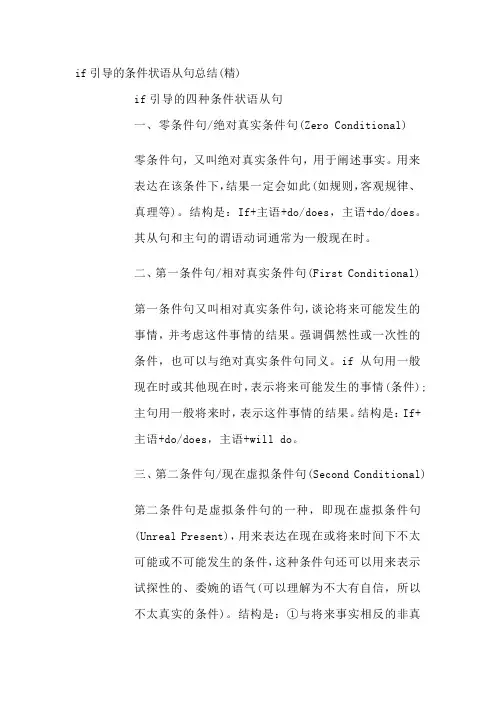
if引导的条件状语从句总结(精)if引导的四种条件状语从句一、零条件句/绝对真实条件句(Zero Conditional)零条件句,又叫绝对真实条件句,用于阐述事实。
用来表达在该条件下,结果一定会如此(如规则,客观规律、真理等)。
结构是:If+主语+do/does,主语+do/does。
其从句和主句的谓语动词通常为一般现在时。
二、第一条件句/相对真实条件句(First Conditional)第一条件句又叫相对真实条件句,谈论将来可能发生的事情,并考虑这件事情的结果。
强调偶然性或一次性的条件,也可以与绝对真实条件句同义。
if从句用一般现在时或其他现在时,表示将来可能发生的事情(条件);主句用一般将来时,表示这件事情的结果。
结构是:If+主语+do/does,主语+will do。
三、第二条件句/现在虚拟条件句(Second Conditional)第二条件句是虚拟条件句的一种,即现在虚拟条件句(Unreal Present),用来表达在现在或将来时间下不太可能或不可能发生的条件,这种条件句还可以用来表示试探性的、委婉的语气(可以理解为不大有自信,所以不太真实的条件)。
结构是:①与将来事实相反的非真实条件句是If+主语+should do/were to do/did,主语+would/should/could/might do;②与现在事实相反的非真实条件句是If+主语+did,主语+would/should/could/might+do。
四、第三条件句/过去虚拟条件句(Third Conditional) 第三条件句是表示与过去事实相反的虚拟语气,是用来表达如果(If)当时那样发生,另外一方面(当时)结果会如何。
通常是指过去的事情,带有一切已经太迟而不能够补救的意思。
结构是:If+主语+had done,主语+would/should/could/ might+have done。
if 条件句的时态搭配1.if从句用一般现在时,主句用一般将来时2.if从句用一般现在时,主句用may/might/canIf the fog gets thicker the plane may/might be diverted.3.if从句用一般现在时,主句用must/shouldIf you want to lose weight you must/should eat less bread.4.if从句用一般现在时,主句用一般现在时5.if从句用现在进行时,主句用一般将来时6.if从句用现在完成时,主句用一般将来时If you have finished dinner I’ll ask the waiter for the bill.。
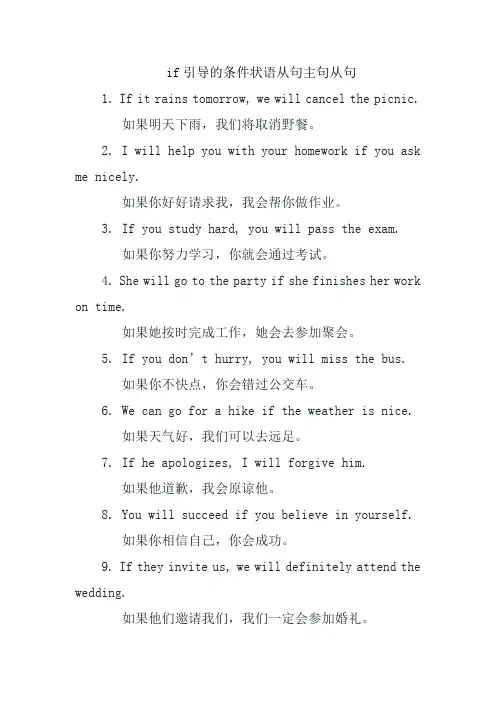
if引导的条件状语从句主句从句
1. If it rains tomorrow, we will cancel the picnic.
如果明天下雨,我们将取消野餐。
2. I will help you with your homework if you ask me nicely.
如果你好好请求我,我会帮你做作业。
3. If you study hard, you will pass the exam.
如果你努力学习,你就会通过考试。
4. She will go to the party if she finishes her work on time.
如果她按时完成工作,她会去参加聚会。
5. If you don’t hurry, you will miss the bus.
如果你不快点,你会错过公交车。
6. We can go for a hike if the weather is nice.
如果天气好,我们可以去远足。
7. If he apologizes, I will forgive him.
如果他道歉,我会原谅他。
8. You will succeed if you believe in yourself.
如果你相信自己,你会成功。
9. If they invite us, we will definitely attend the wedding.
如果他们邀请我们,我们一定会参加婚礼。
10. If you keep practicing, you will improve your skills.
如果你继续练习,你会提高你的技能。
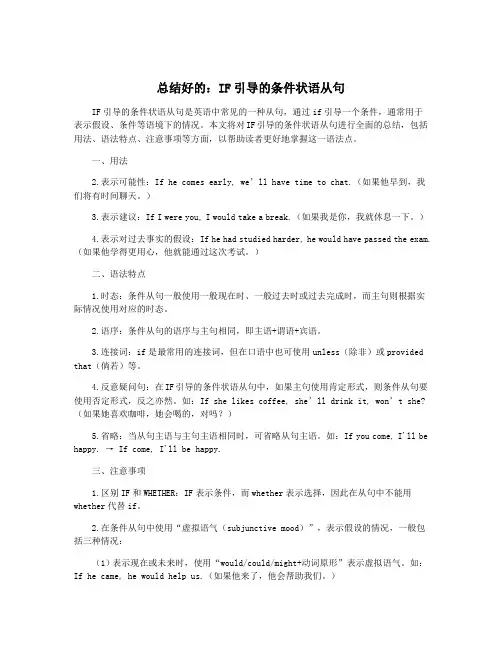
总结好的:IF引导的条件状语从句IF引导的条件状语从句是英语中常见的一种从句,通过if引导一个条件,通常用于表示假设、条件等语境下的情况。
本文将对IF引导的条件状语从句进行全面的总结,包括用法、语法特点、注意事项等方面,以帮助读者更好地掌握这一语法点。
一、用法2.表示可能性:If he comes early, we’ll have time to chat.(如果他早到,我们将有时间聊天。
)3.表示建议:If I were you, I would take a break.(如果我是你,我就休息一下。
)4.表示对过去事实的假设:If he had studied harder, he would have passed the exam.(如果他学得更用心,他就能通过这次考试。
)二、语法特点1.时态:条件从句一般使用一般现在时、一般过去时或过去完成时,而主句则根据实际情况使用对应的时态。
2.语序:条件从句的语序与主句相同,即主语+谓语+宾语。
3.连接词:if是最常用的连接词,但在口语中也可使用unless(除非)或provided that(倘若)等。
4.反意疑问句:在IF引导的条件状语从句中,如果主句使用肯定形式,则条件从句要使用否定形式,反之亦然。
如:If she likes coffee, she’ll drink it, won’t she?(如果她喜欢咖啡,她会喝的,对吗?)5.省略:当从句主语与主句主语相同时,可省略从句主语。
如:If you come, I'll be happy. → If come, I'll be happy.三、注意事项1.区别IF和WHETHER:IF表示条件,而whether表示选择,因此在从句中不能用whether代替if。
2.在条件从句中使用“虚拟语气(subjunctive mood)”,表示假设的情况,一般包括三种情况:(1)表示现在或未来时,使用“would/could/might+动词原形”表示虚拟语气。
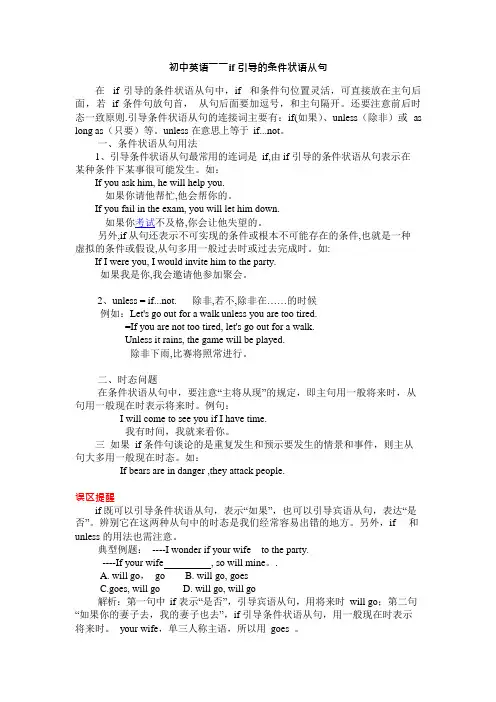
初中英语――if 引导的条件状语从句在if 引导的条件状语从句中,if 和条件句位置灵活,可直接放在主句后面,若if 条件句放句首,从句后面要加逗号,和主句隔开。
还要注意前后时态一致原则.引导条件状语从句的连接词主要有:if(如果)、unless(除非)或as long as(只要)等。
unless 在意思上等于if...not。
一、条件状语从句用法1、引导条件状语从句最常用的连词是if,由if 引导的条件状语从句表示在某种条件下某事很可能发生。
如:If you ask him, he will help you.如果你请他帮忙,他会帮你的。
If you fail in the exam, you will let him down.如果你考试不及格,你会让他失望的。
另外,if 从句还表示不可实现的条件或根本不可能存在的条件,也就是一种虚拟的条件或假设,从句多用一般过去时或过去完成时。
如:If I were you, I would invite him to the party.如果我是你,我会邀请他参加聚会。
2、unless = if...not. 除非,若不,除非在……的时候例如:Let's go out for a walk unless you are too tired.=If you are not too tired, let's go out for a walk.Unless it rains, the game will be played.除非下雨,比赛将照常进行。
二、时态问题在条件状语从句中,要注意“主将从现”的规定,即主句用一般将来时,从句用一般现在时表示将来时。
例句:I will come to see you if I have time.我有时间,我就来看你。
三如果if 条件句谈论的是重复发生和预示要发生的情景和事件,则主从句大多用一般现在时态。
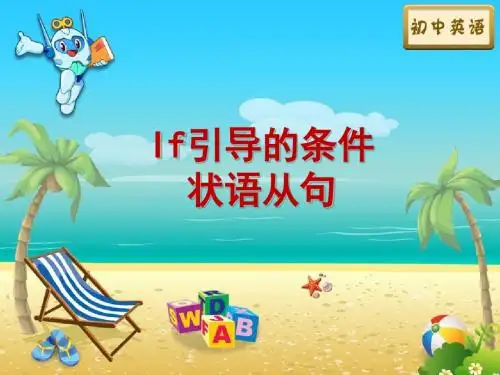
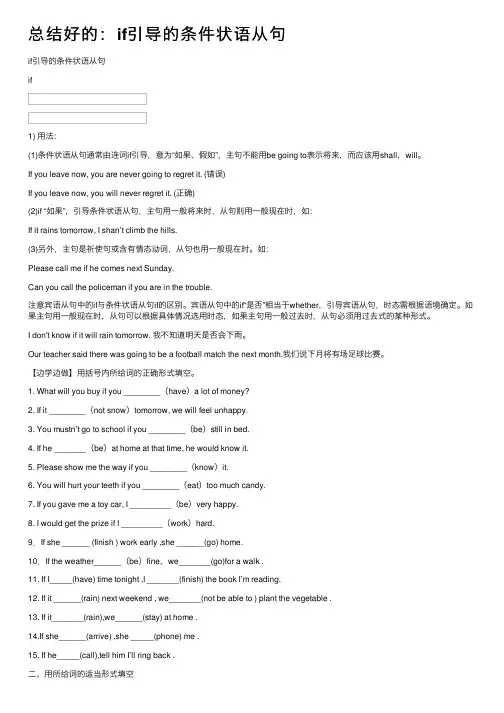
总结好的:if引导的条件状语从句if引导的条件状语从句if1) ⽤法:(1)条件状语从句通常由连词if引导,意为“如果、假如”,主句不能⽤be going to表⽰将来,⽽应该⽤shall,will。
If you leave now, you are never going to regret it. (错误)If you leave now, you will never regret it. (正确)(2)if “如果”,引导条件状语从句,主句⽤⼀般将来时,从句则⽤⼀般现在时,如:If it rains tomorrow, I shan’t climb the hills.(3)另外,主句是祈使句或含有情态动词,从句也⽤⼀般现在时。
如:Please call me if he comes next Sunday.Can you call the policeman if you are in the trouble.注意宾语从句中的if与条件状语从句if的区别。
宾语从句中的if“是否”相当于whether,引导宾语从句,时态需根据语境确定。
如果主句⽤⼀般现在时,从句可以根据具体情况选⽤时态,如果主句⽤⼀般过去时,从句必须⽤过去式的某种形式。
I don't know if it will rain tomorrow. 我不知道明天是否会下⾬。
Our teacher said there was going to be a football match the next month.我们说下⽉将有场⾜球⽐赛。
【边学边做】⽤括号内所给词的正确形式填空。
1. What will you buy if you ________(have)a lot of money?2. If it ________(not snow)tomorrow, we will feel unhappy.3. You mustn’t go to school if you ________(be)still in bed.4. If he _______(be)at home at that time, he would know it.5. Please show me the way if you ________(know)it.6. You will hurt your teeth if you ________(eat)too much candy.7. If you gave me a toy car, I _________(be)very happy.8. I would get the prize if I _________(work)hard.9.If she ______ (finish ) work early ,she ______(go) home.10.If the weather______(be)fine,we_______(go)for a walk .11. If I_____(have) time tonight ,I _______(finish) the book I’m reading.12. If it ______(rain) next weekend , we_______(not be able to ) plant the vegetable .13. If it_______(rain),we______(stay) at home .14.If she______(arrive) ,she _____(phone) me .15. If he_____(call),tell him I’ll ring back .⼆、⽤所给词的适当形式填空1. If you ________(feel) tired, you _________ (have) to have a rest.2. Where _____ he ____(see) the film if he _________(have) time?3. If there ____ (be) fewer trees, there _______ (be) more pollution.4. He ___ (dress) more casually if he ___ (not work) on weekends.5. If Marcia _______ (live) alone, she _______ (keep) a pet parrot.6. Lana _____ (buy) a new dress if the old one ____ (be) out of style.7. The twins _______ (fight) if they__________ (argue).8. I ______ (have) a bake sale if I ____ (need) money for education.9. Peter ____ (send) me a beautiful souvenir if he ____(tour) Spain.10. If Mr. Green _______ (say) I am hard- working, my parents ___ (feel) glad.11. I ______ (go) to the beach if it________ (not rain) this week.12. _____they ___ (have) a match if the P.E. teacher __ (be) busy?13. He ____ (write) a letter to his grandparents if he ____ (get) his report card this week.14. If she ______ (get) up late, she _____ (not catch) the early bus.15. Peter ____ (major) in English if he ____(pass) the exams in Peking University.⼆、完成句⼦1. 他如果看电视太久了,他的⽗母会不⾼兴。
初中英语——If引导的条件状语从句[1](word版可编辑修改)编辑整理:尊敬的读者朋友们:这里是精品文档编辑中心,本文档内容是由我和我的同事精心编辑整理后发布的,发布之前我们对文中内容进行仔细校对,但是难免会有疏漏的地方,但是任然希望(初中英语——If引导的条件状语从句[1](word版可编辑修改))的内容能够给您的工作和学习带来便利。
同时也真诚的希望收到您的建议和反馈,这将是我们进步的源泉,前进的动力。
本文可编辑可修改,如果觉得对您有帮助请收藏以便随时查阅,最后祝您生活愉快业绩进步,以下为初中英语——If引导的条件状语从句[1](word版可编辑修改)的全部内容。
初中英语――if引导的条件状语从句引导条件状语从句最常用的连词是if,常见的if条件状语从句表示在某条件下,某事很可能发生,条件是可能存在的,主句中某种情况发生的概率也是很高的。
如:If you ask him,he will help you.如果你请他帮忙,他会帮你的。
If you fail in the exam,you will let him down.如果你考试不及格,你会让他失望的. If you have finished the homework, you can go home.如果你作业做完了就可以回家了. 另外,if从句还表示不可实现的条件或根本不可能存在的条件,也就是一种虚拟的条件或假设.从句多用一般过去时或过去完成时,表示对现在或过去的一种假设。
如:If I were you,I would invite him to the party.如果我是你,我会邀请他参加聚会。
I would have arrived much earlier if I had not been caught in the traffic.要不是交通堵塞,我本会来得早一些。
另外你还要注意if 条件句的时态搭配1.if从句用一般现在时,主句用一般将来时If he runs he’ll get there in time. 如果他用跑的,他就会及时赶到那儿。
初中英语――if引导的条件状语从句在if 引导的条件状语从句中,if 和条件句位置灵活,可直接放在主句后面,若if 条件句放句首,从句后面要加逗号,和主句隔开。
还要注意前后时态一致原则.引导条件状语从句的连接词主要有:if(如果)、unless(除非)或as long as (只要)等。
unless在意思上等于if...not。
一、条件状语从句用法1、引导条件状语从句最常用的连词是if,由if引导的条件状语从句表示在某种条件下某事很可能发生。
如:If you ask him, he will help you.如果你请他帮忙,他会帮你的。
If you fail in the exam, you will let him down.如果你考试不及格,你会让他失望的。
另外,if从句还表示不可实现的条件或根本不可能存在的条件,也就是一种虚拟的条件或假设,从句多用一般过去时或过去完成时。
如:If I were you, I would invite him to the party.如果我是你,我会邀请他参加聚会。
2、unless = if...not.除非,若不,除非在……的时候例如:Let's go out for a walk unless you are too tired.=If you are not too tired, let's go out for a walk.Unless it rains, the game will be played.除非下雨,比赛将照常进行。
二、时态问题在条件状语从句中,要注意“主将从现”的规定,即主句用一般将来时,从句用一般现在时表示将来时。
例句:I will come to see you if I have time.我有时间,我就来看你。
三如果if 条件句谈论的是重复发生和预示要发生的情景和事件,则主从句大多用一般现在时态。
如:If bears are in danger ,they attack people.误区提醒if 既可以引导条件状语从句,表示“如果”,也可以引导宾语从句,表达“是否”。
初中英语――if引导的条件状语从句引导条件状语从句最常用的连词是if,常见的if条件状语从句表示在某条件下,某事很可能发生,条件是可能存在的,主句中某种情况发生的概率也是很高的。
如:If you ask him,he will help you.如果你请他帮忙,他会帮你的。
If you fail in the exam,you will let him down.如果你考试不及格,你会让他失望的。
If you have finished the homework,you can go home.如果你作业做完了就可以回家了。
另外,if从句还表示不可实现的条件或根本不可能存在的条件,也就是一种虚拟的条件或假设。
从句多用一般过去时或过去完成时,表示对现在或过去的一种假设。
如:If I were you,I would invite him to the party.如果我是你,我会邀请他参加聚会。
I would have arrived much earlier if I had not been caught in the traffic.要不是交通堵塞,我本会来得早一些。
另外你还要注意if 条件句的时态搭配1.if从句用一般现在时,主句用一般将来时If he runs he’ll get there in time. 如果他用跑的,他就会及时赶到那儿。
The cat will scratch you if you pull her tail. 如果你拉猫的尾巴,它就会抓你。
2.if从句用一般现在时,主句用may/might/canIf the fog gets thicker the plane may/might be diverted. 如果雾在大一些,飞机可能就会改在别的机场降落。
If it stops snowing we can go out. 如果雪停了,我们就可以出去。
3.if从句用一般现在时,主句用must/shouldIf you want to lose weight you must/should eat less bread. 如果你想减肥,你必须少吃面包。
4.if从句用一般现在时,主句用一般现在时If you heat ice it turns to water. (也可用will turn)如果把冰加热,它就会化成水。
5.if从句用现在进行时,主句用一般将来时If you are looking for Peter you’ll find him upstairs. 如果你是在找彼得,上楼就会找到他。
6.if从句用现在完成时,主句用一般将来时If you have finished dinner I’ll ask the waiter for the bill. 如果你吃完了,我就叫服务生来算账注意:学习" if " 引导的条件状语从句的用法,现在总结一下:if 条件句不一般,几个要点记心间;条件句,放在前,逗号要放句中间。
条件句表可能,主句多用将来时;条件句表事实,主句常用现在时。
在if 引导的条件状语从句中,如果从句谈论的是一个有可能发生的事实及其产生的相关的结果,主句用一般将来时态,从句用一般现在时态。
如:We can walk there if we can't find a bus .If it rains tomorrow ,we will not go to the zoo.What will you do if you find a panda in danger.如果if 条件句谈论的是重复发生和预示要发生的情景和事件,则主从句大多用一般现在时态。
如:If bears are in danger ,they attack people.在if 引导的条件状语从句中,if 和条件句位置灵活,可直接放在主句后面,若if 条件句放句首,从句后面要加逗号,和主句隔开。
还要注意前后时态一致原则if 条件状语从句的时态练习一.在正确的答案下划一条线。
1.Daina ( will go/go/goes) to Europe if she (will pass/pass/passes) the exams .2. The graduates (will teach/teach/teaches) in the poor village if the Ministry of Education (will agree/ agree/agrees) soon.3. If there (will be/ are/is) a car accident, they (will call/call/calls) 110 for help at once.4. If it (won’t/don’t/doesn’t/ isn’t) rainy, we (will take/ take/takes) walk outside.5. If a UFO (will land/land/lands) in front of me, I (will go/go/goes) in to look for the alien.6. If he (will have/have/has) money, he (will bulid/build/builds) a science lab.7.Don’t wait for me if I (am/ will be) late.8.They (won’t/don’t) go to the beach if it (will rain/rain /rains).9. I (will call/ call) you if he (will stay/stay /stays) at home.10. Mr Smith (will let/ let/lets) you know if he (will need/ need/ needs) help.11. (Will / Do/ Does) he visit the museum if he (won’t / don’t/ doesn’t) get tired?12. Where (will/ do/does) they live if they (will miss/ miss/ misses) the bus?二、用所给词的适当形式填空1.If you ________(feel) tired, you _______________ (have) to have a rest.2. Where _______ he _________(see) the film if he ________________(have) time?3. If there __________(be) fewer trees, there _______________( be) more pollution.4. He _____________(dress) more casually if he ________________( not work) on weekends.5. If Marcia _____________(live) alone, she ___________________( keep) a pet parrot.6. Lana ________________( buy) a new dress if the old one ____________(be) out of style.7.The twins ______________(fight) if they_______________(argue).8. I ____________(have) a bake sale if I _____________(need) money for education.9. Peter _____________( send) me a beautiful souvenir if he ________________(tour) Spain.10. If Mr Green ___________(say) I am hard- working, my parents _________( feel) glad.11.I ____________(go) to the beach if it________________ ( not rain) this week.12. __________they __________( have) a match if the P.E. teacher _____________(be) busy?13.He ____(write) a letter to his grandparents if he ____(get) his report card this week.14. If she ____________(get) up late, she _____________ ( not catch) the early bus.15. Peter ________(major) in English if he ____(pass) the exams in Peking University.15.如果他到的晚了会发生什么事情?What _______________ if he _____________ late?16. 如果努力学习,你就会取得好成绩。
If you__________ _________, you ___________ good _____________.17. 他如果看电视太久了,他的父母会不高兴。
If he _________ TV too much, his parents __________ __________ unhappy.18. 如果我们为他组织生日聚会,大家都会来的。
Everyone ________________ if we _____________ a birthday party __________ him.19. 如果明天不下雨,我会和你一起去公园的。
If it __________ __________ tomorrow, I ______________ go to the park _________ you.20. 如果她睡过头了,就会旅游迟到的。
She;__________________________ the trip if she ___________________.21. 如果他有空,他会帮助你的。